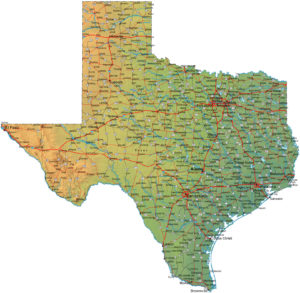The Absurdity of Lopez v. Abbott: The Left’s Frivolous Voting Rights Act Challenge to Statewide Judicial Elections

Texas is somewhat unusual in that, pursuant to the Texas Constitution, all state court judges are elected. I have written about this here and here. Logically, the elections take place within the jurisdictional area of each court. State district judges have county-wide jurisdiction, so the electorate is the county in which the judge sits. Intermediate courts of appeals represent larger geographic areas, typically consisting of many counties (sometimes dozens of counties), and the electorate for those races is the entire district encompassed by the respective courts of appeals. The state’s highest courts are the Texas Supreme Court and the Texas Court of Criminal Appeals (the bifurcated civil-criminal jurisdiction is another unusual feature of Texas’ judiciary), each with nine members. The state’s high courts indivisibly represent all 28 million residents of Texas’ 254 counties. All nine justices on each court are sworn to uphold the Constitution and laws of the state of Texas. Accordingly, every six years, on a staggered basis, each justice stands for election statewide.
On a statewide basis, Texas politics have swung from Democrat to Republican in recent decades (as discussed here), and during roughly the same period the state’s judicial politics have likewise evolved from trial-lawyer domination to being pro-business in outlook. The Texas Supreme Court has had African-American justices (including, for nearly a decade, Chief Justice Wallace Jefferson), Hispanic justices, and female justices. The Court’s current members include two women, Eva Guzman and Debra Lehrmann. Guzman, a Latina from Houston, was reelected in 2016 by a 16 point margin, with the highest number of votes ever cast for a statewide judicial candidate.
Nonetheless, left-wing groups are unhappy that all the justices on the Texas Supreme Court and Texas Court of Criminal Appeals (like all other statewide offices in Texas) are Republican. The Left’s solution to political problems that they cannot solve at the ballot box is to file lawsuits before “friendly” activist judges in federal court. The vehicle is the federal Voting Rights Act. The “theory” is one that MALDEF has successfully used in city council elections: the plaintiffs contend that “at-large” districts discriminate against minority groups by denying them the representation they would enjoy in “single member” districts. So, an out-of-state activist group, the so-called Lawyers Committee for Civil Rights Under the Law, forum-shopped for a reliably sympathetic judge (whom they found in Nelva Gonzales Ramos, an Obama appointee in the backwater of Corpus Christi, Texas). Ramos has demonstrated her liberal predisposition in a separate lawsuit challenging Texas’ voter ID law, which she declared unlawful even though the U.S. Supreme Court has upheld such laws. I discuss that lawsuit here.
Trial is underway in Lopez v. Abbott, the lawsuit challenging the “at-large” election of Texas Supreme Court justices. The plaintiffs argue that statewide judicial elections should be broken into nine separate districts, transparently seeking to carve the Court up into regional factions, allowing the heavily-Hispanic Rio Grande Valley to elect a liberal Democrat instead of the statewide selection of conservative Republicans. This is obviously an effort to subvert the Texas Constitution through partisan gerrymandering at the hands of an unelected federal judge. The case has generated little attention, even within Texas.
I was happy to learn that Dr. John Coppedge, a retired surgeon from Longview, Texas, had written a short article on the case for Quorum Report, a political newsletter. Unfortunately, the article is behind a subscriber-only paywall, so I asked Dr. Coppedge if I could reprint it on my blog. He kindly agreed. As a citizen-activist, Dr. Coppedge is a keen court-watcher who endorses in judicial elections through his group Texas Bipartisan Justice Committee and his website, Vote Smart Texas. The text of his article appears below.

BE CAREFUL WHAT YOU WISH FOR: UNINTENDED CONSEQUENCES MAY AWAIT
There is a lawsuit in Federal Court in Corpus Christi challenging the way Texans elect judges for statewide judicial office.
https://www.texastribune.org/2018/02/12/lawsuit-puts-texas-statewide-elections-judges-trial/
The suit, filed under the Federal Voting Rights Act, seeks to mandate the nine Justices elected to the Texas Supreme Court and nine Judges elected to the Texas Court of Criminal Appeals be elected from nine separate districts, rather than statewide, and that two Hispanic majority districts be created in the Southern and Western parts of the State.
This suit is based on flawed reasoning and is quite myopic. Taking a close look, numerous problems are apparent if one examines the issues and facts and looks ahead at what would occur should the plaintiffs prevail.
First, the two high courts are tribunals that interpret the law as written. They are not city councils or legislative bodies that write the laws. The high courts interpret the law for all people, not just some. And there is not a law that treats any minority differently than it treats the majority. This is entirely different from city councils elections where minority districts are created to represent the minority view on the council and push an agenda benefitting their constituents. There should be no minority or majority interpretation of what the law is. Single member districts would be nonsensical for a court. And basing it on geography is nonsensical as well. The law in El Paso should be the same law as in Dumas.
As an example of how multiple districts can fragment the law, Texas has 14 Courts of Appeals. Not infrequently two or more of these courts rule differently on a point of law. That is where the Supreme Court and Texas Court of Criminal Appeals play a major role in clarifying what the law is for all Texans. The 13th Court of Appeals district is similar to a district that the plaintiffs are asking for. Centered around a large Hispanic population in the Rio Grand Valley, it is made up entirely of Hispanic Democrat judges. But that court seems to hear a different drummer than the other 13 intermediate appellate courts. It is the most frequently reversed Court of Appeals in Texas by the Texas Supreme Court.
Secondly, the plaintiff’s argument implies that the current system deprives Hispanics of the opportunity to achieve statewide judicial office. An examination of the record is in order. There have been fourteen Hispanics serve in a statewide elective office in Texas. Four Democrats and ten Republicans. Two of the Democrats and seven of the Republicans won statewide elections (denoted by *).
And six Hispanics have served on one of the two high courts. Their names are underlined. Two are still serving. And the two Democrats were conservatives. Republican Supreme Court Justice Eva Guzman received more votes for a seat on Texas Supreme Court than other person in history. And a vote from El Paso counted just as much as a vote from Longview.
- Lena Guerro-Texas Railroad Commissioner
- *Raul Gonzalez– Texas Supreme Court Justice
- Pete “Fortunato” Benevides– Judge Texas Court of Criminal Appeals
- *Dan Morales- Texas Attorney General
- *Alberto Gonzales-Texas Supreme Court Justice, United States Attorney General
- *Eva Guzman– Texas Supreme Court Justice
- *Tony Garza-Texas Secretary of State, Texas Railroad Commissioner
- Xavier Rodriguez-Texas Supreme Court Justice
- *Victor Carillo-Texas Railroad Comissioner
- Buddy Garcia- Texas Railroad Commissioner
- *Elsa Alcala– Texas Court of Criminal Appeals Judge
- *David Medina– Texas Supreme Court Justice
- *Ted Cruz- US Senator
- *George P. Bush- Texas Land Commissioner
There is no glass ceiling for conservative Hispanics (or conservative women or conservative African-Americans for that matter) in this very conservative state. There is a glass ceiling for liberals, no matter their ethnicity or gender. The State of Texas is arguing that the reasons are political and not racial and there are good arguments to support that.
A third major point should be obvious if you look ahead to the practical consequences of splitting the state into judicial districts for its two high courts. The plaintiffs in this case, if successful, will diminish the real impact of Hispanic voters, not enhance it. Having one or two members on a nine person court will never provide plaintiffs with a majority. And that majority makes the decisions. The folks who live in the minority precinct would have no say in who is elected to the majority precincts, effectively disenfranchising them. Were the Republican Party of Texas the plaintiff here, asking for the same thing, the current plaintiffs would be loudly protesting it as an attempt to disenfranchise Hispanics.
Plaintiffs also complain that candidates for these courts do not come to El Paso and the Valley to campaign. Actually they do. Since 1994 (the last year a Democrat won a statewide election in Texas), the only election that matters in these races is the Republican Primary. The General Election has been a foregone conclusion. It is unlikely that the plaintiffs in this case were attending Republican fundraisers and campaign events during the Primary season.
Segregating a large segment of the Hispanic population in one or two districts (out of nine) will condemn those voters to always being unable to have their votes decide who the majority of the judges are. They become like one of the poor outlying districts in the “Hunger Games”.
Furthermore it would have the result of strengthening non-Hispanic control over the other seven districts and guaranteeing that control well into the future. The Hispanics who live outside the proposed minority districts are being thrown under the bus by the plaintiffs in this suit.
If , due to projected demographic changes, Hispanics see the possibility of gaining control of all statewide elections in Texas on the horizon, success in this lawsuit will push that horizon out of sight as far as these two courts are concerned. Perhaps they should be careful what they ask for–they might get it.
Finally, the way Texas selects these eighteen judges has been criticized as being too political. That may be a valid point. This proposal would make it more so. A law passed this last legislative session will do away with “straight ticket voting” in General Elections. That has the promise of removing political party label as a primary factor. And that is seen as a step in the right direction. Making these races non-partisan would be another step in the right direction. This suit does not.
No matter how it turns out in Federal District Court, this will almost certainly be appealed to the 5th Circuit Court of Appeals and may take years to be finally resolved. It will have no impact on the current election cycle.
That is the end of Dr. Coppedge’s article. Trial is underway. If Judge Ramos rules in the plaintiffs’ favor, the Fifth Circuit will certainly reverse.
































